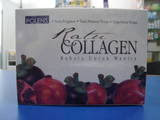 ou use the word diet, it's very likely you'll be misunderstood. That's because the word diet has been used and abused so much, it's come to mean very different and often contradictory things. For instance, you'd think it was a was a mistake if your doctor said you need to gain weight so he's putting you on a diet. What we often don't understand is that diets are not just for weight loss. This article will reveal the truth about diet...that we're always on one.
ou use the word diet, it's very likely you'll be misunderstood. That's because the word diet has been used and abused so much, it's come to mean very different and often contradictory things. For instance, you'd think it was a was a mistake if your doctor said you need to gain weight so he's putting you on a diet. What we often don't understand is that diets are not just for weight loss. This article will reveal the truth about diet...that we're always on one.What Is Diet?
In it's most basic meaning, diet is what we eat and drink. No matter what we eat or drink, it's a diet. Now, my diet over the holidays wasn't a very healthy diet, but it was a diet.Healthy Diet:In our daily diets, if we consume too many fats, carbohydrates or proteins, we'll probably be overweight, and, over time, ill. Poor diets have been linked with numerous diseases, including diabetes, cardiovascular diseases, cancers, etc. This is why many recommend a healthy diet with a balance of nutrients. A good diet is healthy eating, but not "being on a diet" in a weight loss sense. It's just making good food choices to maintain a healthy, energetic life.
Weight Loss Diet:This is probably the most common understanding of the word diet, so, when someone says, "I'm on a diet" they probably mean they're trying to lose weight. Still, diet is too vague a word, because there are many different ways to change your diet to lose weight. You might want to decrease fats (recommended), carbohydrates or proteins to reduce calories and lose weight. Thousands of books and programs have been developed, but, make sure your doctor knows what you're doing because some health conditions can be caused or worsened by weight loss diets.
Other Special Diets: Other specialized diets are too numerous to mention all of them, but here are some examples: Cholesterol lowering diet. Diabetes diet. Low salt diet. Low fat diet. Athlete's diet. Weight gain diet. High fiber diet. Many diets have been prepared by doctors to either add or eliminate certain nutrients to treat various diseases and conditions.
The bottom line is, diet is whatever you eat. The question isn't whether or not you're on a diet, but what kind of diet you're on. Is it healthy, maintaining your weight, while giving you energy and helping prevent disease? Or is your diet making you sick? Don't wait until you have diabetes, like me, to make sure you're on a healthy diet. There's too much at stake.
A Healthy Life: Usually, we're seeking something more than just a balanced diet when we choose to eat right. We want a healthy life...not just a meal. Such a life requires balance in mind, body and spirit. You can get help to achieve this balance by the One who designed us...God. If you want His help to have a healthy life. Healing From God... AMIN ....




No comments:
Post a Comment